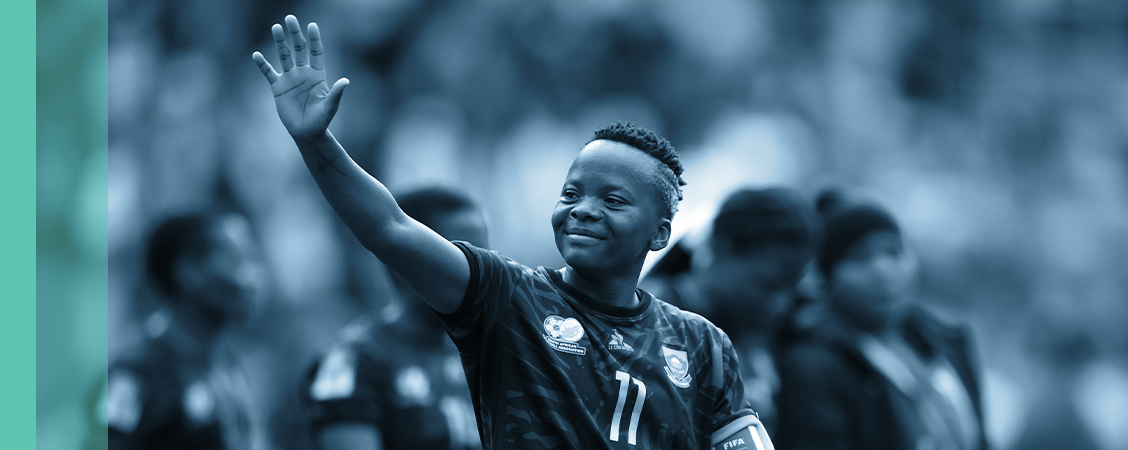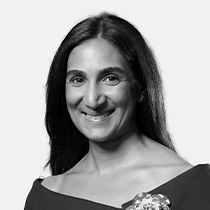
Business & Industry views
Shifting attitudes: The pursuit of distinctive female leadership
The Quick Take
- Over recent decades, significant progress has been made towards greater equality and inclusion of women in society and the workplace
- As expectations for equality and inclusivity rise, women and girls have access to more opportunities than ever before
- Expectations of female leaders and attitudes towards women’s decisions are also shifting
- With these changes come opportunities for women to redefine the nature of leadership
Women’s Month always offers an opportunity to pause and reflect. And what a spectacular start to Women’s Month in South Africa, with both our national women’s football and netball teams delivering impressive performances on an international stage. The advancement of our football team, Banyana Banyana, to the round of 16 in the Fifa Women’s World Cup is an immense source of pride. Likewise, our Protea netball team’s strong performance at the Netball World Cup at home in Cape Town, gave us more reason to boisterously flaunt the green and gold.
That all of this was fully televised would have been unfathomable just a few years ago. Similarly, many of the workplace experiences of my generation thirty years ago are just not tolerated in society today.
As we celebrate women’s contribution to society this Women’s Month, which this year coincides with Coronation’s 30th birthday celebration, it is important that we acknowledge the widespread progress that we have seen in society and the workplace over the past three decades - progress which can be attributed to the unwavering determination and courage of countless women who paved the way for change.
TRACING WOMEN’S PROGRESS THROUGH TIME
Throughout history, many women have consistently demonstrated resilience, strength and determination in the face of adversity. If we look back to the 1800s and early 1900s, activism was focused largely on securing women the right to vote and accessing equal opportunities in education.
Fast-forward to the 1970s, and widespread feminist action focused on achieving equal opportunities and representation within political and economic systems. Feminists faced many challenges – both systemic and societal – not only from opposing men but also from other women.
In response to this, the 1980s saw a vast array of programs to “fix the women” programs that were well-meaning yet misguided in trying to make women more assertive, visible, confident and well-networked. These attempts were trying to make women exactly like their male colleagues, having to fit into the existing patriarchal structures and organisations in order to succeed. At the same time, they all had to be superwomen at home.
Thankfully, the 1990s and noughties shifted the focus to the organisational level. Themes such as the number of women in the boardroom or the C-suite became focal points, as did more diverse recruiting, inclusive talent pipelines, and attention to wider diversity groups beyond gender, such as race, LGBTQ+ and other disenfranchised groups.
PATHWAYS TO INCLUSION
However, while conditions have improved materially in these 30 years, we cannot ignore the stark realities that persist in many parts of the modern world. Women and other disenfranchised groups continue to face discrimination, violence, and unequal access to education, healthcare, and economic opportunities. These challenges must unite us in our commitment to fostering a truly inclusive global society.
We must also remember that inclusivity goes beyond gender. It encompasses people of diverse backgrounds, ethnicities, religions, abilities, and sexual orientations. It means standing in solidarity with all those who face compounded challenges due to intersecting forms of discrimination.
Thankfully, the world now expects inclusivity. Movements like #MeToo, #TimesUp and #BlackLivesMatter mean that the inclusion of previously excluded parties is firmly on the agenda. To achieve inclusivity, we must break down the barriers that have served to hold certain groups back for far too long. It begins with challenging the stereotypes and biases that limit a person’s potential.
We need to firmly entrench in our societies and education systems the belief that women and girls can excel in any field they choose, whether it be science, technology, business, politics, or arts. There should no longer be a need to spend time dismantling the historic notions about what women should or should not do.
Inclusivity also entails providing a supportive and nurturing environment for all. This means implementing policies that make bias or unequal treatment illegal. It also means creating safe spaces where people feel empowered to voice their opinions, contribute their ideas, and participate fully in decision-making processes.
Critical in the quest for inclusivity is an emphasis on the power of education. Education is one of the greatest game-changers for women and girls around the world. It is both an enabler and force multiplier for women's economic, political and social empowerment and, ultimately, gender equality.
By investing in girls’ education and promoting lifelong learning for women, we can create a more equitable world where all can thrive.
Inclusive societies also require the active involvement of men as our allies and advocates. Men play a crucial role in changing patriarchal norms and in supporting women’s rights. Together, we can change harmful behaviours and attitudes that perpetuate inequality. And, together, we can build a world where every person is respected and valued.
SHIFTING ATTITUDES
As expectations for equality and inclusivity rise and information spreads faster and wider than ever before, organisations face unprecedented scrutiny from candidates, consumers, communities, investors, governments, and the media regarding their support for and treatment of women. Most corporates now publicly publish annual Diversity, Equity & Inclusion (DEI) reports and participate in various indices and surveys.
All of this is a good start because, as we know, what gets measured, ultimately gets managed. It is important that we focus on the right issues, that we draw appropriate conclusions and that we look for meaningful solutions.
My own observation of the significant change we have seen over the years is that women and girls today are fortunate to have many more choices. Many more doors are open today, and many more women are involved in the corporate world, in roles that span all layers of organisations.
This is exciting, as it should be the catalyst for shifting attitudes. The first shift relates to the expectations of women in leadership positions. Previously, when there were fewer women in leadership positions, there was so much pressure on these women to resemble the perfect role model for future generations.
Many of the expectations were frankly inhumane. Every time a female leader voluntarily chose to step off the treadmill or made a mistake, it was very unfairly used as an example of what to expect from all women.
The truth is inadequate female leaders exist just like inadequate male leaders exist. We should no longer be looked at as representing an entire group.
The second shift that I am hoping for is a break from the obsession with the C-suite and titles of the 90s and noughties. Women’s choices should not necessarily be viewed as their inability to overcome the hurdles or barriers they encounter or their inability to persevere. Instead, these decisions can simply reflect personal lifestyle preferences. Success is not just measured in terms of the title that we carry around.
Finally, a big positive shift that continues to gain momentum is that more and more women are stepping into their own power and unapologetically rejecting the archaic notion that women in leadership positions must be carbon copies of their male counterparts. In my experience, it is these shifts in attitudes that unlock true inclusivity in organisations and result in rich and diverse thought leadership.
OUR GREATEST OPPORTUNITY
As we celebrate Women’s Month, I call upon each one of you to take action in your own spheres of influence. As American congresswoman Bella Abzug said, “In the 21st century, women will change the nature of power rather than power changing the nature of women.” This must surely be our greatest opportunity.
Let us commit to fostering inclusivity every day of the year. Let us dismantle some of the barriers that remain and keep agitating for a fairer, truer society and equal representation in every room and at every table.
Inclusivity is not just a goal - it is a continuous collective journey that is by no means easy. It requires courage, persistence and empathy.
Let us be the change we want to see in the world and work hand in hand to build a society where every woman can dream big and can have the opportunity to achieve her aspirations while helping others to do the same.
*This article is an edited version of a speech delivered by Kirshni Totaram at Coronation’s Women’s Day Breakfast 2023.
Disclaimer
SA retail readers
SA institutional readers
Global (ex-US) readers
US readers
 South Africa - Personal
South Africa - Personal


